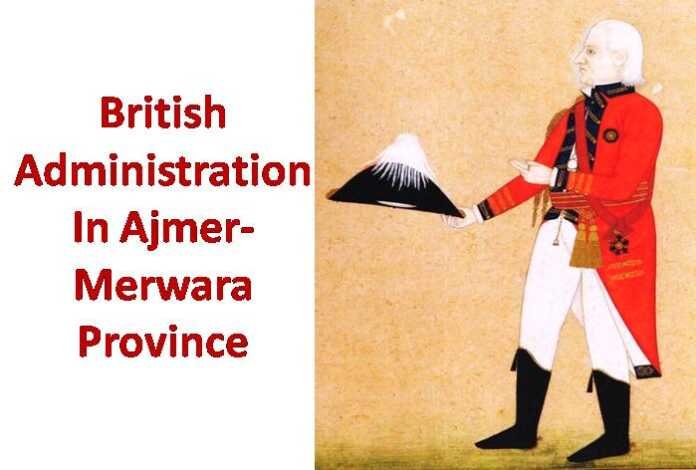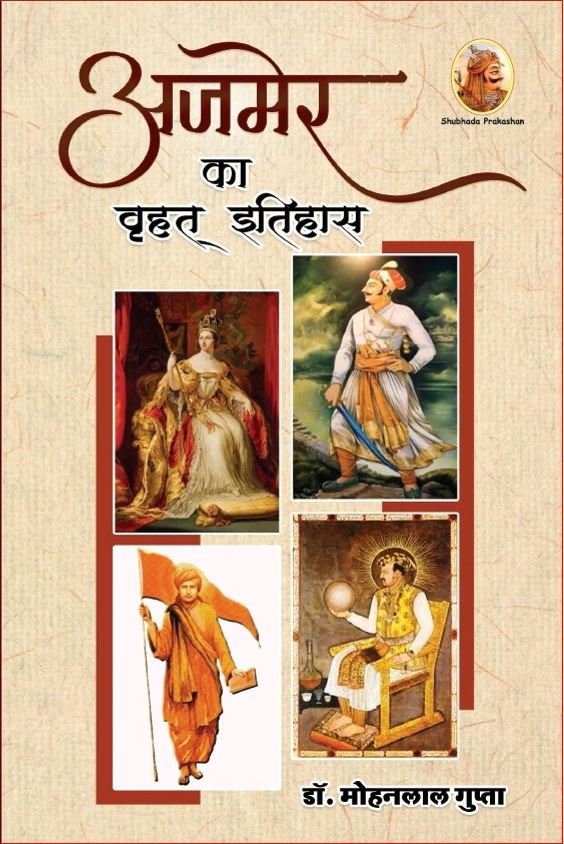East India Company signed a treaty with Maratha General Daulat Rao Sindhia in 1818 A.D. According to this treaty Company took over the charge of the territory and Ajmer-Merwara Province came into existence. After some years the Company took over the remaining region of Merwara from Marwar (Jodhpur) and Mewar (Udaipur) also. Thus british administration In Ajmer-Merwara province started.
East India Company wanted to establish a close supervision over the princely states of Rajputana. For this purpose Company established the Nasirabad cantonment and a new town of Beawar. The administration of this province was entrusted to the Agent to the Governor-General, Rajputana. (A. G. G. of Rajputana)
The close affinity and geographical contiguity of Ajmer-Merwara with Rajput states and the presence of Istimrardars, a feudal aristocracy of Ajmer Merwara, complicated the problem of administration by mixing it with the problem of handling relations with the Rajput rulers and their blood relations.
These relations were under the control of A. G. G. in Rajputana and hence the charge of running the administration of Ajmer-Merwara had to be entrusted to him.
Ajmer was created a non-regulation province in 1871 because various political and administrative difficulties were experienced in running its administration as part of North West provinces. The agent to Governor General, who was ex-officio Commissioner Ajmer-Merwara since 1858, had enjoyed the powers of a session judge. The reversal of his decisions by the Allahabad High Court resulted in a considerable loss of dignity and prestige of the agent, G. G. there by creating difficulties in his relations with the states of Rajputana. The prestige of the agent, G. G., had fallen so low that while marching through Rajputana all such precautions had to be taken as were necessary in an enemy’s territory.[1]
A second major difficulty was that the agent, G. G., had his headquarters at Mt. Abu for six months in a year. The administrative requirements of a province forced him to table work and thus rendered him unable to undertake tours of the various states in Rajputana.
The British Government, while creating a separate province of Ajmer Merwara in 1871, pretended to do so with a view to creating a more efficient administration. However, the desire to protect and uphold the prestige of the agent to the Governor General, was more than the desire to improve the administrative efficiency. The civil administration of the province demanded time and attention which could not be devoted by the Agent to the Governor-General, who gave priority to diplomatic and political relations with the Rajput states. The two functions kept ill comp any together. Political and diplomatic duties required constant tours and personal cont acts with the rulers of Rajputana states while efficient civil administration required t able work and physical presence on the spot.[2]
The civil administration of Ajmer Merwara, an outlying and unconnected British province in the heart of Rajputana, was bound to prove difficult as the role allotted to it was a peculiar one. On the one hand the British government could not divest itself of a desire to establish an improved civil administration with a view to maintaining its reputation for efficient administration, on the other it had to subordinate it to the policy of converting Ajmer-Merwara as a training ground for its political officers.[3]
Both these goals were subordinated to the desire to make the Ajmer administration self-sufficient. It was soon realised that improving the administrative efficiency would be a big financial investment with no return.
The judicial administration of the province was the first significant casualty under the new set up. The agent to Governor-General was designated Judicial Commissioner for Ajmer-Merwara and was made the highest court of appeal in the province. Its justification was that the highest judicial authority could vest only in the Chief Commissioner who was the head of the ‘Non-regulation’ province; it could not be conferred on any other authority-superior or equal in rank asthat would have undermined his prestige and authority in the eyes of the Raiput states who were expected to pay due respect to the agent to Governor-General.
This set-up concentrated judicial power in executive officers. The British political officers, who were ill-equipped with either legal training or legal knowledge, were entrusted with judicial work in the province. Therefore facilities of expert legal advice and experienced judicial officers were not made available to the residents of the province. The British government justified this arrangement on the ground of seeking to provide a simple and cheep judicial administration, free from legal technicalities and of not embarrassing the native states with all those technical formalities which were necessary for a well regulated judicial administration.
The British, by subordinating administration of justice to political convenience, encouraged an unhealthy development. The political officers considered judicial work a burden and tried to postpone deciding cases.[4]
The average duration of civil cases increased from about 19 days in 1880-1881 to about 490 days in 1935-36; while in the criminal cases it increased from 6.4 days in 1880-81 to 94 days in 1929-30.
In the educational sphere, the Ajmer administration made various experiments in order to cure the malaise of educational backwardness. The Director, Public Instruction, North West Provinces, was the controlling authority upto 1872; after wards the Commissioner Ajmer-Merwara became the ex-officio Director, Public Instruction with no officer to devote whole time attention to education in the province. The Principal, Government college, Ajmer, was an ex-officio Inspector of Schools who was supposed to look after the whole district.
Realising that the Commissioner was not able to supervise the educational set up, the post of a Superintendent for education for Ajmer and Delhi was created in 1912, but no one was appointed to fill the post for a decade. In 1923 the Educational Commissioner, Government of India was entrusted with the duty of looking after Ajmer; in 1930A Superintendent of Education for Ajmer-Merwara, Delhi and Central India was appointed. These officers had their headquarters outside Ajmer and they naturally could not devote much time to education in the province.[5]
The British land revenue administration in Ajmer-Merwara had two aspects -attitude towards the landed aristocracy, i. e., the Istimrardars; and the policy of land settlement in are as which were under the direct control and administration of the British government. The British government had in the beginning placed itself under an obligation to protect the rights of the tenants in Istimrari estates.
But with a view to winning their favour the British adopted an apparently favourable policy towards the Istimrardars, though in the long run this policy turned out to be responsible for the spread of dissatisfaction in their estates. The British at first refused to entertain complaints by the tenants against the Istimrardars there by encouraging the latter to consider the former as tenants at will. This served various purposes.
Firstly, the British Administration In Ajmer-Merwara Province appeared much better than what it really was by a comparison with the condition and state of affairs prevalent in the Istimrari estates. The government had adopted an attitude of willful neglect towards the tenants in Istimrari estates so that their position continued to deteriorate steadily.
Secondly, the discontent among the Istimrari estates lowered the prestige of the Istimrardars in public eyes and ultimately provided an opportunity to the British to interfere in their internal affairs in 1930 when the situation had become so critical that it was likely to be exploited by the nationalists and other discontented elements to embarrass the government. To prevent greater public agitation, the government appointed a committee to suggest suit able tenancy legislation. The tenants, however, were held in awe by the Istimrardars and, being strongly attached to their hereditary lands, strained every nerve to put up with a high rental and harsh treatment at the hands of the Istimrardars rather than abandon their lands. The British government had forgotten its duty to protect the tenants in the interests of maintaining friendly relations with the Istimrardars.
In the area under the direct management of the British Administration In Ajmer-Merwara Province, the British did not undertake any broad schemes of providing irrigation facilities. Even the land settlements were changed thrice-in 1874, 1887 and 1910 each time seeking to stabilise and increase the land revenue without caring for the facilities of irrigation to the tenants. The Istimrardars’ estates covered more than 61% of the total available land in the province yet the amount to be realised from the crown lands was Rs. 28,000/- more than what was realised from the Istimrardars.
Even in maintaining an efficient police administration for law and order, there was much scope for improvement. The salary, allowances and working conditions of the police were unsatisfactory; the average vacancies in the police force after 1871 were about 15% of the sanctioned strength. The provincial authority acknowledged that the real reason for this state of affairs was the poor and unusually bad living conditions. Service conditions were not attractive and better pay was Available elsewhere in the province.[6]
The low pay made them corrupt and often it was found on inquiry that the police of Ajmer was implicated in the burglaries in the town. Resignations and death were quite frequent. The police force failed to attract and retain competent staff. The Superintendent police was over burdened with work. He had to inspect and pay periodical visits to the various police stations and to keep watch over a long unsafe by order. This kept him constantly busy and led to ineffective supervision which paved the way for greater corruption among the staff.
The police force was always available at half its sanctioned strength. About 36% of the serious crimes remained undetected. The investigation department remained under-staffed so much so that investigation of crimes and burglaries was often refused in a large number of cases.
The extent to which the British government was prepared to consider Ajmer-Merwara a ‘civilised’ and ‘progressive’ district is evidenced by the fact that the British continued to consider it sufficiently backward to entitle it being governed by the Scheduled Districts Act. For this reason the British government did not introduce any democratic institutions in the province. When in the twenties of the present century A demand was put forward for establishing a Legislative assembly, the Government advanced a number of arguments and did not introduce even this small measure of reform although Coorg, another Non-Regulation province, had this privilege.
Frequent references are available in government records to show that the British sought to establish Ajmer-Merwara administration a model of efficiency. But the British administration failed to provide even the elementary facilities which were available to people in other provinces. Its topmost executive officers were expected to carry on political activities finding little time for routine administrative work.
The judicial administration was in the hands of people who had no judicial training and took little interest in judicial work. In matters of land tenure and the protection of the rights of tenants, the British government had allowed freedom to the Istimrardars and the peasant proprietors had become tenants-at-will. In educational matters Ajmer appeared to be advanced in comparison to other Rajput states but it was far behind other British provinces. The Mayo College was established for political rather than for educational reasons. In 1920’s when there was a demand for Legislative Assembly, the government asserted that Ajmer did not possess a requisite number of educated and qualified persons who could run the Legislative Assembly. Even in Municipal administration the Ajmer municipality had not been functioning efficiently.
Although British Administration In Ajmer-Merwara Province had almost all the departments which were established in a regular province yet it suffered in efficiency because too m any departments were kept under a single officer. These officers were hardly able to devote time to their departments since they lacked training as civil administrators. The British were primarily interested in strengthening their hold on Rajputana. Therefore their object to establish a model administration in Ajmer was hedged in by a number of considerations. Firstly, nothing was to be done which could even indirectly lead to dissatisfaction among the neighboring Rajput states; secondly, the administrative expenditure of Ajmer-Merwara should be met out of the revenues of the province.
Some british officers even doubted whether the British Administration In Ajmer-Merwara Province was superior to that of the native Rajput States.
As early as 1877 Lord Lytton had noted that the attempt to create British Administration In Ajmer-Merwara Province into a model would be like maintaining a show farm by a wealthy gentleman.
What practical value could be attached to an example of model administration if it was being run at a dead loss. Thus by comparison with some of the neighboring states in Rajputana, British Administration In Ajmer-Merwara Province appeared to be better but its inhabitants suffered under an inefficient system in comparison to the other provinces of British India.
REFERENCES
[1] For. Pol. A, Dec. 1870, nos. 626-639.
[2] DR. M. S. Jain, A Critical Appraisal Of British Administration In Ajmer Province. 1871-1935 A.D.
[3] Pol.A, July 1877, nos. 253-265.
[4] Administrative Report for 1917-18.
[5] DR. M. S. Jain, A Critical Appraisal Of British Administration In Ajmer Province. 1871-1935 A.D.
[6] administrative Report for 1914-15.





